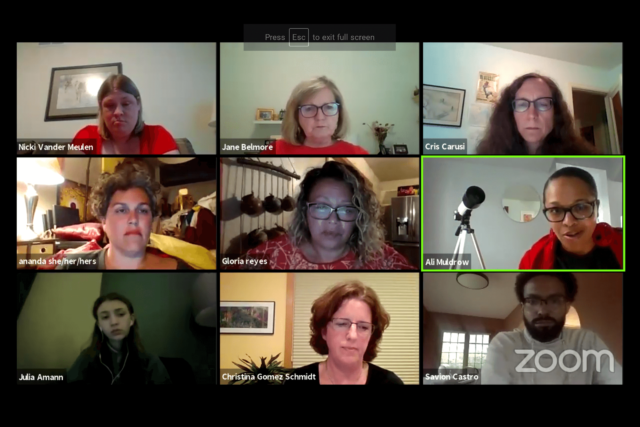The termination of the contract between the Madison Metropolitan School District (MMSD) and the Madison Police Department (MPD) will put an end to a situation that has resulted in a disproportionate number of arrests of African American students in the district’s four high schools. This in turn will allow for the creation of an environment that encourages developmentally appropriate intervention for inappropriate behaviors exhibited by students. This, MMSD Board of Education Vice President Ali Muldrow said, is the reasoning behind the decision to end the contract with MPD for placement of School Resource Officers (SROs) in district high schools.
Muldrow’s comments regarding the disproportionate arrests of black students in four high schools are backed by the data obtained from the annual reports available on Madison Police Department’s website. The data suggests that there might have been more or less fluctuation in arrests reported in the last three years, but black and African Americans students have consistently shared an overwhelming majority of the arrests. Officers have been deployed at all four high schools since the mid-1990s, but only data from the last three years pertaining to the arrests and citations of students in these high schools is available.
According to the annual reports from 2017 to 2019 available at MPD’s website, the black and African Americans accounted for over 75 percent of total arrests every year, despite making up about 18 percent of the high school student body. During the academic year of 2019 alone, 36 out of the 44 physically arrested students at MMSD high schools were African Americans. 27 out of total 45 citations issued were given to African Americans. In 2018, 30 out of 36 arrested students were black which made 83.3 percent of total arrests, and 97 out of total 128 citations were issued to them which was 75.8 percent. In 2017, 121 out of total 162 arrested students were black which makes 74.7 % of total arrests, and 91 black students out of total 126 citations were issued which makes 72 percent.
Responding to a question about the possible available options after police officers are gone from the schools, Muldrow said the police presence in schools is a very small part of the safety and security infrastructure of school buildings and the district.
“There are so many people who work in such a wide range of capacities within our district to ensure the health and safety of young people we work with,” she said. “We are going to promote wellness and safety to the fullest possible extent. That’s part of the reasons schools are closed during the pandemic and continue to be closed.”
She said the school board is going to embrace restorative justice, which is something the district has been working on for a long time.
“I think we are going to invest in things throughout the district that allow for us to change the climate and address things such bullying, harassment at schools,” she said. “It is more about creating healthy options. It is more about getting kids healthcare interventions when they need healthcare interventions and it is something to make sure that kids have counsellors and people they can talk to and trust But we cannot just stop having police in school and continue to disproportionately suspend and expel African American students. You cannot do that,” she said.
Muldrow said hundreds of thousands of dollars are spent on police and the board is considering to create more healthy and welcoming options.
In an email to Madison365, Acting Police Chief Victor Wahl stated that it’s disappointing that the program appears to be ending, without recognition of the real work that the SROs have done or understanding of the consequences that will follow their removal from the schools. He further stated that for years, MPD’s school resource officers have played an instrumental role in maintaining a safe learning environment at MMSD’s four high schools. They’ve developed relationships with faculty, students, and staff; these connections have allowed them greater insight and background when working with MMSD to solve problems (both long-term and short-term) in the schools.
“The SROs worked seamlessly with school staff, and have had a positive impact on our schools. The progressive way that our school resource officers approached their work is a model for others to follow,” he stated.
According to the police department’s website, school resource officers’ mission is to ensure the overall safety of students, staff and the MMSD community by helping to create a safe environment, build trust, serve as mentors, act as an overall resource for the entire school community and look beyond arrests and citations to solve problems. The SROs are briefly trained by the National Association of School Resource Officers (NASRO). The NASRO provides SROs training of teachers, informal counselors and law enforcement officers. In the recent past, MMSD also allocated money for trainings of SROs. These short trainings included providing tools for officers to build positive relationships with both students and staff, knowledge and skills as a law enforcement officer, informal counselor, and educator, to better identify and respond to students who are suspected of having a mental health need, develop the critical skills and capacity for appropriately responding to the many predictable behavior issues that are typically observed among adolescents with mental health needs. A course states Crime Prevention through Environmental Design (CPTED). CPTED uses design, management, and activity strategies to reduce opportunities for crime to occur, to reduce fear, and to improve the overall safety of schools.
However, not a single website indicates that SROs are sufficiently trained for any of the roles stated above. The SROs get brief trainings and are then deployed to address criminal behaviors.
Muldrow said different officers have performed that role in very different ways and there have been times where there have been more or less arrests, but consistently across the board, the majority of the kids who get arrested are African Americans in a country that once enslaved their ancestors.




























